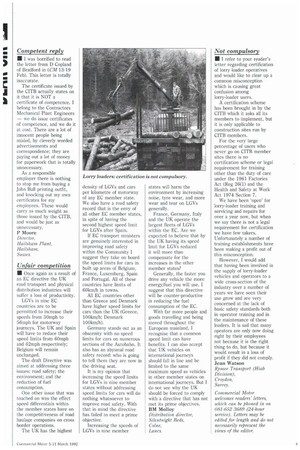Unfair competition
Page 47

If you've noticed an error in this article please click here to report it so we can fix it.
Once again as a result of an EC directive the UK road transport and physical distribution industries will suffer a loss of productivity.
LGVs in nine EC countries are to be permitted to increase their speeds from 50mph to 56mph for motorway journeys. The UK and Spain will have to reduce their speed limits from 60mph and 62mph respectively; Belgium will remain unchanged.
The draft Directive was aimed at addressing three issues: road safety; the environment; and the reduction of fuel consumption.
One other issue that was touched on was the effect speed differentials within the member states have on the competitiveness of road haulage companies on cross border operations.
The UK has the highest density of LGVs and cars per kilometre of motorway of any EC member state. We also have a road safety record that is the envy of all other EC member states, in spite of having the second highest speed limit for LGVs after Spain.
If EC transport ministers are genuinely interested in improving road safety within the Community I suggest they take on board the speed limits for cars in built up areas of Belgium, France, Luxemburg, Spain and Portugal. All of these countries have limits of 60km/h in towns.
All EC countries other than Greece and Denmark have higher speed limits for cars than the UK (Greece, 100km/h; Denmark 100km/h).
Germany stands out as an obscenity with no speed limits for cars on numerous sections of the Autobahn. It also has an abysmal road safety record: who is going to tell them they are now in the driving seat.
It is my opinion that increasing the speed limits for LGVs in nine member states without addressing speed limits for cars will do nothing whatsoever to improve road safety. With that in mind the directive has failed to meet a prime objective.
Increasing the speeds of LGVs in nine member states will harm the environment by increasing noise, tyre wear, and more wear and tear on LGVs generally.
France, Germany, Italy and the UK operate the largest fleets of LGVs within the EC. Are we expected to believe that by the UK having its speed limit for LGVs reduced it will more than compensate for the increases in the other member states?
Generally, the faster you drive any vehicle the more energy/fuel you will use. I suggest that this directive will be counter-productive in reducing the fuel consumption of the EC.
With far more people and goods travelling and being moved throughout the European mainland, I recognise that a common speed limit can have benefits. I can also accept that UK vehicles on international journeys should fall in line and be limited to the same maximum speed as vehicles in other member states on international journeys. But I do not see why the UK should be forced to comply with a directive that has not met its prime objectives, BM Molloy Distribution director, Si lentnight Beds, Colne, Lancs.












































































































